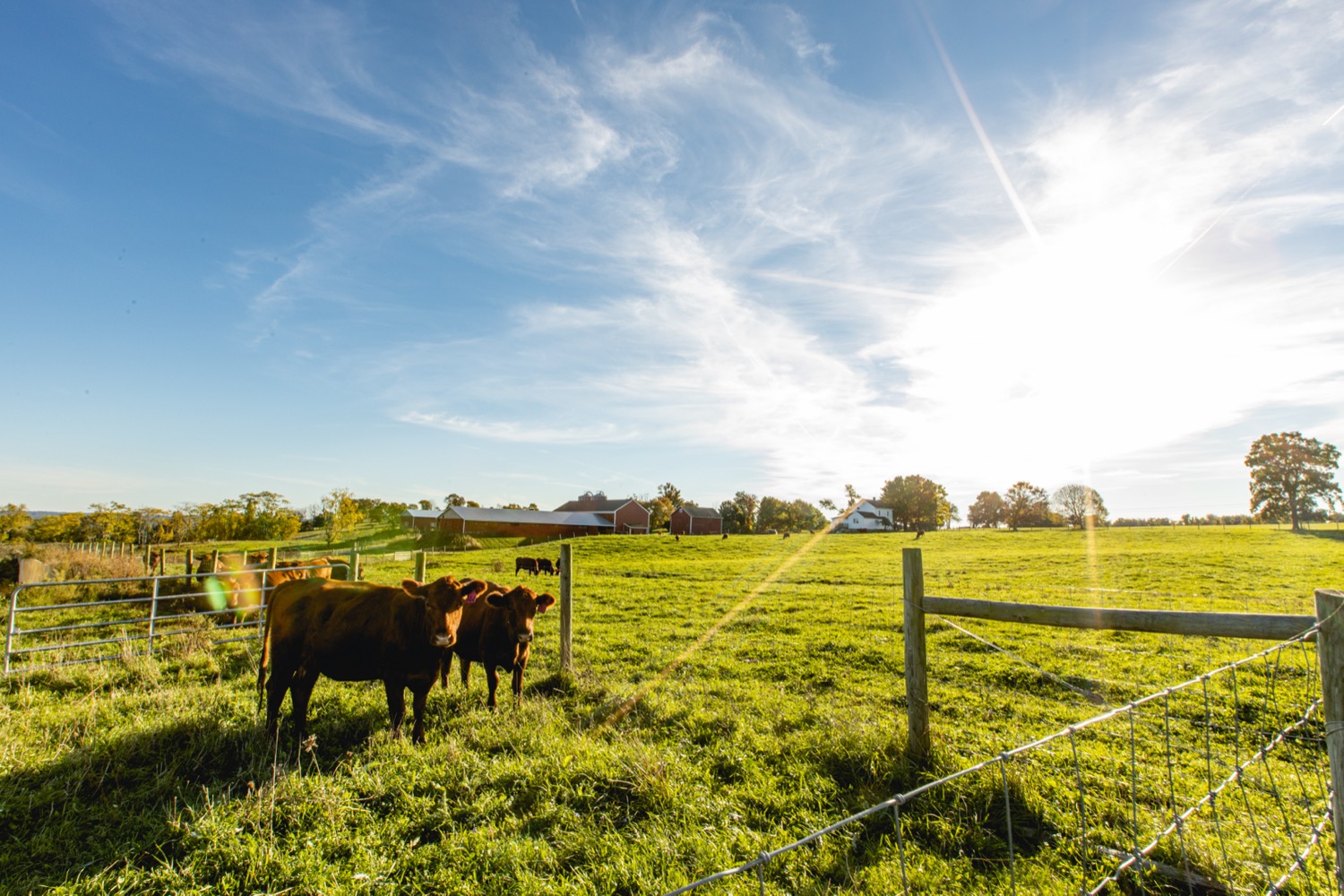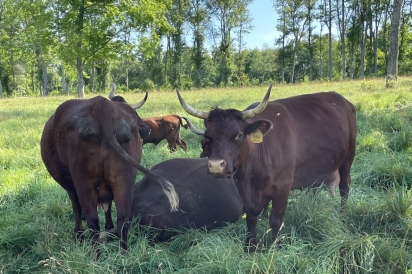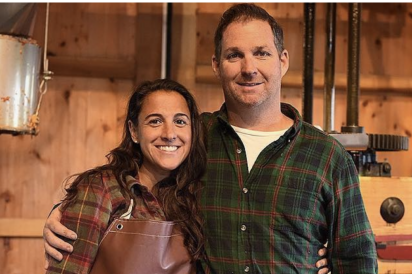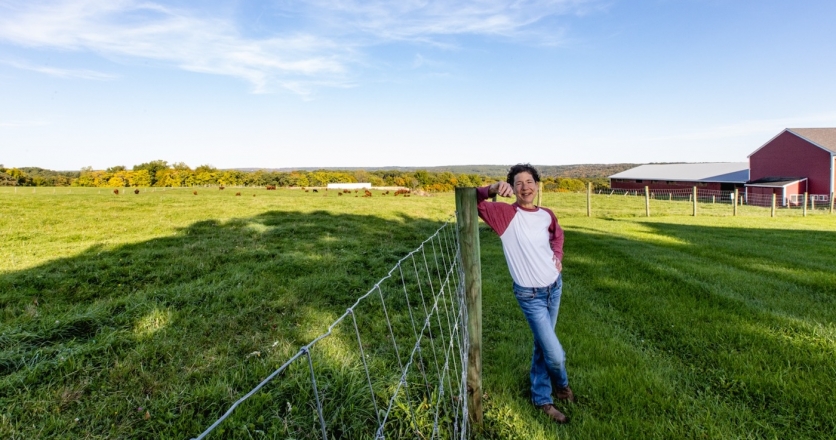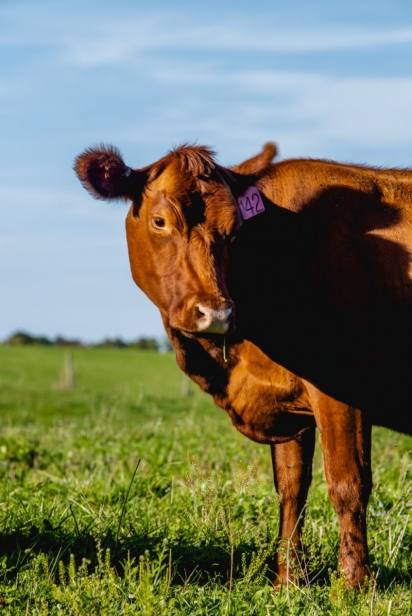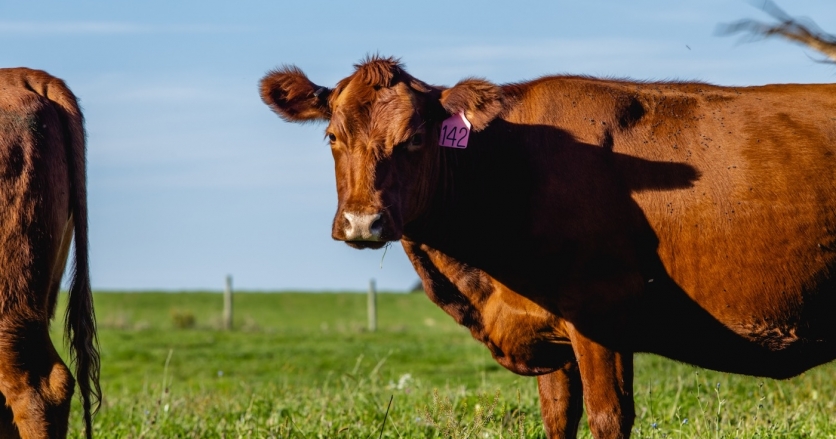To Eat or Not to Eat
If you grew up in the ‘80s or '90s, it was commonly understood that red meat was considered bad for our health and best eaten only on a limited basis. This conception is finally beginning to fade, in part thanks to new studies and diets that suggest that the quality of the meat in question — particularly the quality of the life the animal has led and the feed it has been raised on — has a significant impact on its health benefits.
This is a point that Patty Taylor, co-owner of Devon Point Farm in North Stonington, has long been trying to make. She and her husband, Erick, run an organic farm with North Devon cows and a heritage mix of Red Wattle and Gloucester Old Spot pigs, and they contend that there’s a big difference between organic, hormone-free, non-GMO, antibiotic-free, grass-fed beef and the mass-manufactured beef that comes from packed feed lots. Their cows are humanely raised entirely on pasture and given hay from those same grasses in the winter — no supplemental grain — which they believe leads to a marked difference in their beef’s health benefits.
“There’s different red meat. It’s like there are no two apples alike,” Taylor explains. “If you get an apple that’s organic, as opposed to an apple that’s been sprayed with chemicals and spent a week on a truck ripening along the way, it’s not the same food. You can’t compare the two things.”
In recent years, Taylor has seen growing numbers of people seeking out grass-fed beef, even including some customers who acknowledge that they were formerly vegan or vegetarian, but who are consciously making the switch to the “right” kind of meat. Many of them explain how they ended up with certain health issues — lower energy level, lower strength and stamina — without the balance of lean protein. And, as Taylor notes, protein-rich diets have become more commonplace. “A decade ago, I wasn’t hearing [about] diets like Keto or Paleo,” she says. “That might be driving the desire to eat healthy with clean meat. It’s gaining popularity, because these diets are working for people.”
Ken Schwanfelder, a customer of Taylor’s at Devon Point Farm, lives with his wife, Cathy, in North Madison. He says that they tried other organic farms, but the beef was dry and just didn’t have the marbling necessary for a flavorful meal. Several years ago, they came across the Taylor’s farm, from whom they now buy a quarter share of beef and a half of pork. “We bought a sampling of beef from Patty,” he says. “I stopped eating to call her up. I said, ‘I just ate the best grass-fed beef I’ve ever had!’”
Schwanfelder went on to say there has been a growing desire to know what is in your food and avoid chemicals, preservatives, and other additives. Add to that the lingering memory of a pandemic in which store shelves were often picked clean and empty. As a result, more people started to grow their own food and seek out people who were producing food locally and sustainably, which is where farmers like the Taylors come in.
Deb Stuart and her family have a lot in common with the Taylors. She is the co-owner of Stuart Family Farm in Bridgewater. They have a retail store, home delivery, and bulk shares of beef and pork. She talked about farming much the same way Taylor did — it’s a passion, a relentless job without holidays or weekends, and you’ve got to love it to do it. As the pandemic began steering people toward a better food supply, she said her farm suddenly had more orders than they could handle.
“We got bombarded by beef orders,” she says. “During the pandemic…we had people lined up down the road waiting for the store to open. We’ve gained a loyal following. We’ve got a lot more young people, more young families. Parents are tuned into how they want to feed their children. There has definitely been a shift [toward] getting farm-raised, grass-fed beef.”
She says that, 15 years ago, they were one of the only games in town. But now, that has changed. As more consumers have begun to take interest in the origin of their food, more grass-fed farms have appeared to accommodate them. She believes that a greater interest in wellness has a lot to do with this. “Society has obesity and other illnesses and metabolic problems. People are looking for a healthier option.”
Nick Quatrano, one of Stuart’s customers, agrees. As a 33-year-old father of two in Newtown, he describes how he felt when he ate pastured meat. “It’s a lot easier on my body, as far as digestion,” he says. “Whenever I’ve eaten the grain-fed, GMO meat…I get indigestion. The premium you pay for grass-fed is worth it because you’re getting a healthy animal.”
Scott Tracy, 63, is also one of Stuart’s customers. “I don’t want GMOs or any of that mass-manufactured meat. I like that [the Stuart’s beef] is grass fed and grass finished. I’ve used a few other services, but her stuff is the best tasting I’ve had so far.” (When meat is grass fed and grass finished, that means the animal has fed only on grass and other foraged plants its entire life, with no supplemental feed.)
Farmer Kelley Babbin of Howling Flats Farm in North Canaan, a small, family-run farm offering antibiotic-free, non-GMO, pasture-raised beef, pork, and lamb, got turned off by “factory farms” more than a decade ago. She touts the health benefits of pastured meat, saying that it can “lengthen your telomere loops, has vitamin K2, healthy cholesterol and fats, antioxidants, and crucial minerals.” This sentiment is echoed by Susan Burkowsky from Why Not Farm in Bethlehem, who says that red meat is “an excellent source of iron and zinc and contains all nine amino acids your body needs for good health.”
A February 2021 research article published in the Frontiers in Sustainable Food Systems journal supports what these farmers have been saying all along, that grass-fed red meat is more beneficial for your health than grain-fed. The researchers pointed out that when animals forage on pasture, the potential for their meat and milk to contain anti-inflammatory phytonutrients — things like terpenoids, phenols, carotenoids, and tocopherols — goes up substantially. A February 2022 research article from the U.K. published in the Foods journal backs up these claims. “Access to forage, whether fresh or conserved, is a key influencing factor for meat fatty acid profile, and there is increasing evidence that pasture access is particularly beneficial for meat’s nutritional quality.”
Farmers, consumers, and scientific research all seem to be drawing the same conclusion: rather than demonizing specific foods, we should be concentrating on the processes that go into the production of our food. Cattle that are raised in natural, pastured conditions and allowed to feed as the grazers they are results in healthier animals and beef that is, in turn, healthier for people to consume. Thankfully, Connecticut’s growing abundance of small pastured cattle farms makes finding and choosing well-raised beef an increasingly viable alternative.


